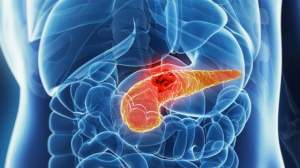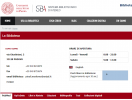Verso un vaccino per il cancro al pancreas:
Posted by giorgiobertin su novembre 27, 2017
È stato scoperto dai ricercatori dell’Ospedale le Molinette di Torino e del Centro Oncologico ed Ematologico Subalpino (COES), un vaccino contro il tumore al pancreas. Il vaccino è già stato sperimentato sugli animali con esiti positivi. Se i risultati si potessero estendere agli esseri umani, aumenterebbe la sopravvivenza dei malati affetti da tumore al pancreas, un tumore molto aggressivo da combattere, troppo spesso fatale.

La presentazione di questa scoperta è stata fatta durante il convegno “La ricerca pre-clinica e l’approccio multidisciplinare nel tumore del pancreas: vantaggi e opportunità nella pratica clinica”, che si è svolto il 24 novembre.
“La maggior parte dei pazienti con tumore pancreatico produce anticorpi contro alfa-enolasi ed i ricercatori del mio gruppo hanno dimostrato che i pazienti che hanno anticorpi anti-alfa enolasi nel sangue rispondono meglio alle terapie antitumorali“, ha affermato il professor Novelli. Analizzando le risposte anticorpali nei pazienti contro l’alfa-enolasi, è stato sviluppato un vaccino risultato efficace nell’aumentare l’aspettativa di vita di animali da esperimento con tumore pancreatico.
L’approccio combinato tra nuove chemioterapie, nuovi farmaci immunoterapici e vaccini può rappresentare la chiave per aumentare la sopravvivenza dei malati affetti da questo tumore.
Leggi il full text dell’articolo:
Targeting of surface alpha-enolase inhibits the invasiveness of pancreatic cancer cells
Moitza Principe, Patrizia Ceruti, Neng-Yao Shih, Michelle S. Chattaragada, Simona Rolla, Laura Conti, Marco Bestagno, Lorena Zentilin, Sheng-Hui Yang, Paola Migliorini, Paola Cappello, Oscar Burrone, and Francesco Novelli
Oncotarget. 2015 May 10; 6(13): 11098–11113.







DANIELA PELOTTI said
HUMAN RECOMBINAT ALFA-ENOLASE ANTIBODIES IN CELIAC DISEASE AND IN OTHER AUTO-IMMUNE DISEASES
Baldas, V1; Edomi, P2; Cortini, A2; Ziberna, F1; Azzoni, E2; Liciulli, M2; Ferrara, F1; Not, T1
Journal of Pediatric Gastroenterology & Nutrition: May 2006 – Volume 42 – Issue 5 – p E22
Notices: 39th Annual Meeting of the European Society for Pediatric Gastroenterology, Hepatology and Nutrition Dresden, Germany, June 7-10, 2006: Abstracts: PG1-14
Author Information
Article Outline
Celiac disease (CD) is a gluten-dependent autoimmune disease in which the auto-antibodies against the tissue transglutaminase enzyme represent a tool for the diagnosis. Recent study using a proteomic approach identified the alfa-enolase enzyme (AE) as auto-antigens involved in CD immune response.
Back to Top | Article Outline
Aim:
We evaluated the usefulness of the IgA anti-human recombinant AE antibodies (anti-h-AE) in the diagnosis of CD and we screened the phage display intestinal-antibody libraries to isolate anti-h-AE.
Back to Top | Article Outline
Material and methods:
We cloned AE cDNA from human brain using primers specific for the gene. The AE was produced by cloning the cDNA into an expression vector, expressed in bacteria and the AE was purified under non-denaturating conditions. With an ELISA assay we analyzed the serum samples of 42 untreated CD-patients (30F, median age 12y), 10 patients with type1 diabetes (6F,19y), 8 patients with type2 diabetes (5F,59y), 21 patients with rheumatoid-arthritis (19F,12y), 15 patients with inflammatory-bowel disease (6F,15y), 184 healthy controls (97F, 10y). Normal values of the anti-human-AE were taken3SD above the mean of 100 healthy subjects.
Back to Top | Article Outline
Results:
24/42 (57%) CD-patients were tested positive, 9/10 (90%) type1 diabetics and 2/8 (25%) type2 diabetics testing positive, 15/21 (72%) patients with rheumatoid-arthritis testing positive, 2/15 (13%) patients with IBD, 2/184 (1.1%) healthy controls testing positive. We detected 4/45 and 3/45 positive anti-h-AE clones from two CD-patients’ intestinal biopsies.
Back to Top | Article Outline
Summary:
IgA anti-h-AE were positive both in CD-patients and in patients suffering from other autoimmune disorders. Phage-display assay indicating that the anti-h-AE in CD occurs at the intestinal level.
Back to Top | Article Outline
Conclusions:
The human-AE is really a new-auto antigen involved in autoimmune disorders. Our phage display libraries data support the hypothesis that tolerance to the AE is broken in the gut in CD-patients. The widespread production of this auto-immune antibody don’t allow us for the diagnostic purpose. Further studies need to demonstrate the gluten-dependent nature of the anti-h-AE in CD and the role of this auto-antibodies in the autoimmune disorders.